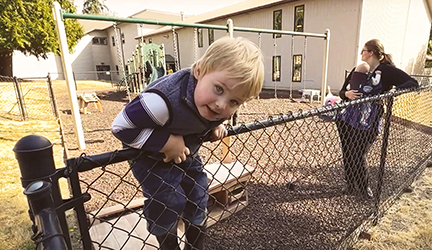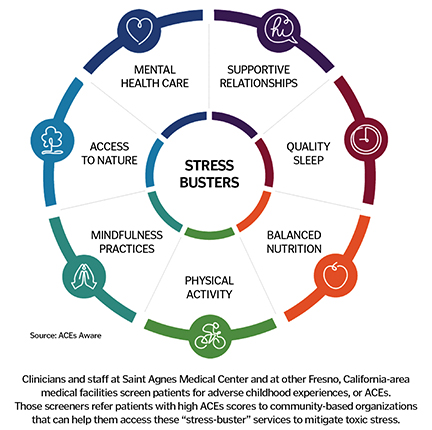By JULIE MINDA
Decades of research establish that severe, chronic traumas endured in childhood can have far-reaching negative impacts on physical and mental health over a person's lifetime.
The Centers for Disease Control and Prevention says heart disease, cancer, respiratory diseases, diabetes and suicide — five of the 10 leading causes of death in the U.S. — are associated with the cumulative, chronic stress caused by multiple adverse childhood experiences,
or ACEs.
 This family received support from A Family Place in Oregon, including parenting classes, kids' clothes, diapers and access to social services. The aid helped the mother to escape an abusive home situation and stabilize her life. Providence St. Joseph
Health's Oregon region has been providing funding to northwestern Oregon's Lutheran Community Services Northwest for its A Family Place services.
This family received support from A Family Place in Oregon, including parenting classes, kids' clothes, diapers and access to social services. The aid helped the mother to escape an abusive home situation and stabilize her life. Providence St. Joseph
Health's Oregon region has been providing funding to northwestern Oregon's Lutheran Community Services Northwest for its A Family Place services.Individuals who have high scores on ACEs screenings have a higher probability of requiring special education, dropping out of high school, becoming teen parents, experiencing severe depression, and being arrested for criminal behavior.
Preventing severe childhood traumas or providing interventions and treatments to children and adults whose childhoods have been marred by cumulative trauma could significantly reduce the probability of developing these conditions, says the CDC. ACEs include
physical, emotional and sexual abuse or other violence in the home; neglect; a parent with mental illness or substance use disorder; divorce; or having an incarcerated loved one. Preventing ACEs, says the agency, could save almost 2 million people
from developing coronary artery disease, spare 2.5 million from becoming overweight or obese and prevent 21 million cases of depression.
Two Catholic health systems are among those intervening to prevent adverse childhood experiences and to lessen the risk of harmful outcomes for children and adults who have experienced significant childhood trauma.
A Trinity Health family medicine clinic and a Providence St. Joseph Health region both have joined with community partners to lessen harms of ACEs with treatments, services and support.
 Yankey
YankeySee something, do something
Dr. Rachel Yankey is a family medicine practitioner with Saint Agnes Care, the provider network for Trinity Health's Saint Agnes Medical Center in Fresno, California. She is a physician champion
for an ACEs screening and referral system developed by Saint Agnes and its community partners.
She says, "Our population is struggling" with illnesses associated with ACEs and physicians aren't usually aware of the impact of the ACEs. "They don't necessarily know about ACEs because the science is relatively new." Training medical providers about
ACEs has been an essential part of the screening system rollout, she says.
$112.5 billion price tag
A team of Saint Agnes physicians, family medicine clinic residents and a community benefit leader has been the driving force behind the development and implementation of the ACEs screening and
referral system at Saint Agnes.
The group had responded to a call to action by California's first surgeon general, Dr. Nadine Burke Harris, who identified ACEs as a public health priority and established the state's ACEs Aware initiative. The initiative uses grants to equip health care
and social service providers to screen their patients and clients for ACEs and to connect people to the interventions they need to recover from the trauma and live more healthfully.
Saint Agnes physician champions challenged medical residents in one of the hospital's clinics — a family medicine clinic treating a large percentage of low-income patients and patients covered by the Medi-Cal state Medicaid program — to develop
a workable screening program to earn one of the ACEs Aware initiative grants. Several family medicine residents took on the challenge. They developed the framework for the program and wrote up and presented a white paper citing estimates that California
spends about $112.5 billion annually to treat the consequences of adverse childhood experiences. The residents' efforts earned a $100,000 ACEs Aware initiative grant to fund the medical provider training that was needed to start the screening program.
Expanded network
In June 2020, Saint Agnes' community health and well-being department and the hospital's family medicine residency program launched a pilot screening and treatment referral program devised by the residents.
Residents in training at the family medicine clinic, attending physicians and medical assistants completed hybrid online and in-person training. The curriculum defined ACEs, described the health consequences of chronic activation of the body's stress
response system during childhood, taught providers to use an ACEs screening tool developed by the ACEs Aware initiative and covered how trauma-informed care can mitigate harm for patients who have been impacted by ACEs.
The clinic adopted the ACEs screenings and interventions as an ongoing program. Additional medical assistants are in training now to administer the screening tool.
The Saint Agnes team collaborated with Fresno-area health care and social service organizations to win a $2.6 million ACEs Aware initiative grant in 2021. They used it to create a "network of care" that relies heavily on more than 30 community health
workers who are employed by Saint Agnes and some of the participating organizations. The community health workers help individuals with high ACEs scores to get mental health care and other services from Saint Agnes and other providers.

The network includes Saint Agnes and six other medical providers, as well as community-based organizations serving very vulnerable populations: undocumented immigrants, refugees, people with mental illness, people who identify as LGBTQ+, Black
pregnant women and infants, human trafficking victims, foster children, domestic violence survivors and families with children who have special needs.
Tailored questionnaire
The family practice clinic hopes to screen all of its pediatric and adult patients who give consent. Medi-Cal reimburses for one ACEs screening for adults and one per year for children
insured under Medi-Cal.
Questionnaires are tailored to the patients' ages — there's one form for adults, another for teens and one for parents or guardians to fill out for children.
Since the screening program's inception, more than 200 Saint Agnes patients have been linked to follow-up services to address the impacts of childhood trauma. The community health workers track the patients' progress through the medical record
system. Saint Agnes plans to expand the use of the screening tool to other hospital departments.
Yankey says ACEs can affect people's ability to cope with life's challenges over the long term but mitigating the impacts of the trauma through intervention can reduce the harms.
"This is part of the shift in medicine from simply treating illness to working more to prevent people from getting the illnesses," she says.
Going upstream
To reduce the incidence of childhood abuse and neglect and to promote stability among families undergoing severe hardship and trauma in northwest Oregon, Providence Health & Services helps
support A Family Place relief nurseries in three Oregon communities. The nonprofit Lutheran Community Services Northwest uses state and private funds including the Providence Health & Services grants to operate the relief nursery services.
Emily Garrick-Steenson, advancement manager for Lutheran Community Services Northwest, says the relief nurseries are the "last, best chance" for families plagued with trauma, homelessness, mental health problems, substance dependency, unemployment,
food insecurity, poverty, domestic violence or other damaging stressors.
Break the cycle
Programs that improve parent-child interactions, bolster family stability and increase parent employment have been shown to strengthen family economics, build resilience and lessen the harms of
childhood traumas.
Garrick-Steenson says the relief nursery model originated in Eugene, Oregon, more than 40 years ago. To be classified as a relief nursery in the state, facilities must be certified with the Oregon Association of Relief Nurseries.
Garrick-Steenson says relief nurseries have been shown to increase children's ability to build social and emotional competencies and to increase caregivers' ability to support their children's emotional development.
Expanding services
Lutheran Community Services Northwest opened the first A Family Place in McMinnville in October 2013. It has expanded its network to include relief nurseries in Newberg and Willamina —
all three cities are in Yamhill County, Oregon.
The programming aims to strengthen families and support positive childhood development through mental health counseling, therapeutic classroom instruction for children from age 18 months until kindergarten, and courses that improve parents' mental
health and parenting skills. A Family Place also offers home visits by a teacher interventionist, a trained navigator for families with babies. Teachers may make visits to the homes of their preschool students. The Lutheran Community Services'
Safe Families for Children can arrange temporary foster care placements for children while their parents receive intensive services.
In 2022 A Family Place served more than 600 children.
Mike Antrim is senior communication manager for Providence Health & Services in northwest Oregon, which is part of Providence St. Joseph Health. He says Providence has given about $700,000 to Lutheran Community Services Northwest, including
for ongoing mental health and refugee services. About $200,000 of that amount has funded relief nursery and mental health services in Yamhill County.
The health system also has lent its staff's fundraising expertise, helping A Family Place to access and leverage state funding. Providence support helped A Family Place to lay the groundwork for its 2021 expansion into Willamina, a logging community
that had gone through an economic bust.
Garrick-Steenson says there had been a lot of unaddressed mental health issues linked to family financial stress in Willamina including increased depression, substance abuse and child abuse and neglect.
The grants from Providence are helping pay for a doubling of the classroom space for the Newberg relief nursery and a tripling of Lutheran Community Services Northwest's mental health offices in the same building.
For the coming school year, Lutheran Community Services Northwest is expanding school-based mental health services it offers at Newberg elementary and middle schools. That work is done in partnership with Providence, which provides school-based
mental health services at the high school level.
To increase outreach to the Latino community in Yamhill County, A Family Place is intent on hiring more Spanish-speaking staff.
One client, featured in a promotional video, says she had a young child and a baby on the way when she first connected with A Family Place. A Family Place staff provided clothing for her children, connections to social services, and parenting
education — the first step to a foundation that allowed her to escape an abusive relationship. "I now have a safety net," she says.
These videos explain what adverse childhood experiences are and the impact they can have.
» Centers for Disease Control and Prevention video
» Office of the California Surgeon General (video at bottom of page.)
Adverse childhood experiences covered in screening tool
A Saint Agnes Medical Center family medicine clinic and other participants in the Fresno, California, network of care use screening tools from the California surgeon general's ACEs Aware initiative to assess people's exposure to adverse
childhood experiences or ACEs.
The screening tools are available in multiple languages and are tailored for different age groups.
The tools screen for exposure to experiences in childhood, including:
- Physical, emotional or sexual abuse
- Physical or emotional neglect
- Living in a household affected by:
- Incarceration
- Mental illness
- Substance abuse
- Parental separation or divorce
- Intimate partner violence
- Discrimination
- Housing instability
- Food insecurity
- Serious physical illness or disability
- Death of a parent or caregiver
According to information from the ACEs Aware initiative, screeners calculate scores by the total number of ACEs categories experienced, not the severity or frequency of any one category. The higher a patient's ACEs score, the greater the
risk for ACEs-associated health conditions. The ACEs Aware initiative materials say that if individuals experience exposure in four or more categories, they are at high risk for the type of toxic stress that can lead to worsened health
outcomes.
Information on the screening tools is available at acesaware.org/learn-about-screening/screening-tools/.
Network of Fresno providers addresses adverse childhood experiences
Saint Agnes Medical Center is among the dozens of Fresno, California-area organizations that have formed a "network of care" to address the impact of adverse childhood events, or ACEs, in people's lives. The network is using grant dollars
allocated by the California surgeon general's office for screenings to identify people who have experienced ACEs. The partner organizations then connect those who have been harmed by ACEs with help.
Saint Agnes started the work in 2020 and then the network of care with the other partners formed in 2021.
Among the network's accomplishments:
- Nearly 700 people from a total of 72 organizations have received training in what ACEs are, how to screen for them and how to help people access services to reduce ACEs' impacts.
- Medical teams from seven medical facilities including Saint Agnes have taken part in the training. Some of these facilities include federally qualified health centers and school-based health centers. There are more than 100 medical
providers now screening for ACEs in the Fresno area.
- About 30 community-based organizations have joined with the seven medical centers as part of the network of care. Those organizations screen their own clients for ACEs, and provide services to people identified at other partner locations
as having high ACEs scores.